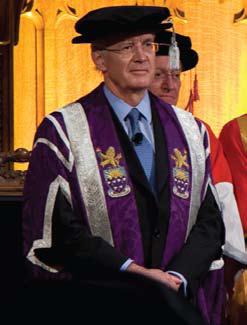A boost for education over profit?
Article published: Friday, March 12th 2010
Alan Gilbert, Vice-Chancellor of the University of Manchester, has announced that he will retire at the end of the current academic year. Former Students Union officers Robbie Gillett and Jennie O’Hara discuss his record.
 Alan Gilbert came to Manchester in 2004 to see in the merger between UMIST (University of Manchester Institute of Science and Technology) and Victoria University Manchester, creating the University of Manchester. With the ‘2015 Agenda’ Gilbert sought to propel Manchester into the ranks of the world’s elite universities. Yet the self-styled ‘President’ leaves in his wake a controversial legacy. He oversaw the creation of the UK’s biggest university, a massive building programme, job cuts, a push for higher tuition fees, and an increasingly business-oriented approach to higher education.
Alan Gilbert came to Manchester in 2004 to see in the merger between UMIST (University of Manchester Institute of Science and Technology) and Victoria University Manchester, creating the University of Manchester. With the ‘2015 Agenda’ Gilbert sought to propel Manchester into the ranks of the world’s elite universities. Yet the self-styled ‘President’ leaves in his wake a controversial legacy. He oversaw the creation of the UK’s biggest university, a massive building programme, job cuts, a push for higher tuition fees, and an increasingly business-oriented approach to higher education.
In his time at Manchester, Gilbert has unapologetically aimed to direct higher education institutions towards the needs of business, to lessen dependency on diminishing government funds. In business speak, this is called “mixed-funding sourcing”. Others call it creeping privatisation. Either way, it led to drastic changes at the University during Gilbert’s reign.
The administration was slow to respond to warnings from staff and students about the declining quality of teaching. Many felt that the 2015 Agenda’s search for high-profile international prestige, together with the lucrative fees from international students, was undermining standards on campus. While popular and acclaimed academics such as Sheila Rowbotham, Terry Eagleton and, more recently, Hillel Steiner felt the swing of management’s axe, celebrity figures like Martin Amis have been brought in at £3,000 per hour for little more than brochure appearances.
Student dissatisfaction made itself felt in April 2008 when hundreds of students marched on campus under the banner Reclaim the Uni, occupying buildings in protest at dwindling contact hours, poor feedback, increased fees, and declining resources.
Gilbert responded that students should be grateful for the University’s research focus, arguing that the prestige it brings makes degrees more economically valuable. For many students and staff, this perfectly reflected Gilbert’s understanding of the role of universities – his unwavering endorsement of the market principle that puts an economic value on everything, including the learning experience. His policies have come at a price.
Manchester slumped to 24th in the Times ‘Good University Guide 2010’, and the Senior Management Team at the University remains worried about the prospect of declining applications.
Gilbert was truly an ideological warrior of the Nineties and Noughties, when the corporate agenda has reigned supreme. His leadership style ranged from authoritative to authoritarian, with things rarely moving until the say-so came from the top. He tended not to budge from his position, most notably when Manchester was one of the few universities in the UK not to give concessions to the upsurge in student protests over the attack in Gaza last year.
Those who knew about Gilbert’s record in Australia saw all this coming. At the University of Melbourne he established the profit-seeking subsidiary Melbourne University Private. The resulting protests in 2001 make Manchester’s seem tame – 70 students forced their way into his office and trashed his study.
Gilbert said he believes the student experience at Manchester “can be considerably improved”. Too true. We wish him a happy retirement, and hope the new VC – Professor Dame Nancy Rothwell, according to insiders – can re-focus the University towards its students, and less towards its business clients.
More: Manchester, Opinion
Comments
-
Universities should be seats of knowledge, not profit making business enterprises.
Lets hope the next Vice Chancellor at the University of Manchester has more of a social conscience.
Comment by Mervyn Drage on April 6, 2010 at 5:45 pm -
[…] centre to the detriment of undergraduates. Former elected officers at the Students Union (UMSU) have argued for instance that the ‘mixed funding’ – or privatisation – approach taken […]
Pingback by University of Manchester falls again in Guardian rankings — MULE on June 9, 2010 at 6:02 pm
The comments are closed.



